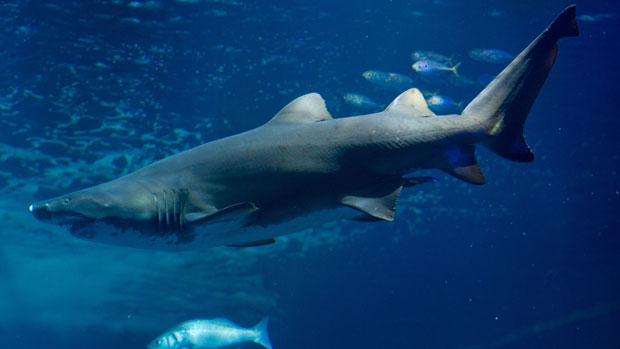50 sharks killed in controversial Australian cull
None of the sharks killed were great whites – the species responsible for recent attacks

A free daily email with the biggest news stories of the day – and the best features from TheWeek.com
You are now subscribed
Your newsletter sign-up was successful
MORE than 170 sharks were caught on baited drum lines and 50 of the largest ones were killed under the Western Australian government’s controversial shark cull policy.
The cull was introduced after a spate of fatal attacks along Australia’s western coastline, but none of the sharks caught between 25 January and 30 April was a great white – the species held responsible for the attacks.
A total of 172 sharks were caught, the ABC reports. Of those, 50 tiger sharks longer than three metres were destroyed. The largest shark was caught at Perth’s Floreat Beach measuring 4.5 metres.
The Week
Escape your echo chamber. Get the facts behind the news, plus analysis from multiple perspectives.

Sign up for The Week's Free Newsletters
From our morning news briefing to a weekly Good News Newsletter, get the best of The Week delivered directly to your inbox.
From our morning news briefing to a weekly Good News Newsletter, get the best of The Week delivered directly to your inbox.
Fisheries Minister Ken Baston insisted that the policy has been a success, saying it has “restored confidence among beachgoers and contributed to understanding of shark behaviour”, The Australian reports.
Protesters argue that culling sharks has not been proven to have any positive effect, and only serves to damage the sea's delicate ecosystem.
Labor party fisheries spokesman, Dave Kelly, said: "The policy is very unpopular, it has hardly caught any of the sharks it was destined to catch. What people want is scientific research to show why the government thinks this policy makes our beaches safer."
Greens Party MP Lynn MacLaren agreed, saying that the cull has not improved swimmers’ safety and should be abandoned: “We know that the great white shark is the shark that has been implicated in fatalities off our coast and no great white sharks were captured on the drum lines in this whole program," MacLaren said. "To claim that this strategy has in any way improved beach safety is complete bunkum".
A free daily email with the biggest news stories of the day – and the best features from TheWeek.com
The drum line program is part of the state government’s controversial £12 million shark policy that also includes aerial and jet ski patrols, rapid response initiatives, and tagging and research programmes.
-
 Political cartoons for February 15
Political cartoons for February 15Cartoons Sunday's political cartoons include political ventriloquism, Europe in the middle, and more
-
 The broken water companies failing England and Wales
The broken water companies failing England and WalesExplainer With rising bills, deteriorating river health and a lack of investment, regulators face an uphill battle to stabilise the industry
-
 A thrilling foodie city in northern Japan
A thrilling foodie city in northern JapanThe Week Recommends The food scene here is ‘unspoilt’ and ‘fun’
-
 Epstein files topple law CEO, roil UK government
Epstein files topple law CEO, roil UK governmentSpeed Read Peter Mandelson, Britain’s former ambassador to the US, is caught up in the scandal
-
 Iran and US prepare to meet after skirmishes
Iran and US prepare to meet after skirmishesSpeed Read The incident comes amid heightened tensions in the Middle East
-
 Israel retrieves final hostage’s body from Gaza
Israel retrieves final hostage’s body from GazaSpeed Read The 24-year-old police officer was killed during the initial Hamas attack
-
 China’s Xi targets top general in growing purge
China’s Xi targets top general in growing purgeSpeed Read Zhang Youxia is being investigated over ‘grave violations’ of the law
-
 Panama and Canada are negotiating over a crucial copper mine
Panama and Canada are negotiating over a crucial copper mineIn the Spotlight Panama is set to make a final decision on the mine this summer
-
 Why Greenland’s natural resources are nearly impossible to mine
Why Greenland’s natural resources are nearly impossible to mineThe Explainer The country’s natural landscape makes the task extremely difficult
-
 Iran cuts internet as protests escalate
Iran cuts internet as protests escalateSpeed Reada Government buildings across the country have been set on fire
-
 US nabs ‘shadow’ tanker claimed by Russia
US nabs ‘shadow’ tanker claimed by RussiaSpeed Read The ship was one of two vessels seized by the US military